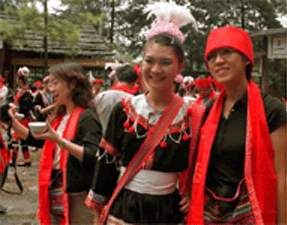 Archaeologists have discovered ancient cultural relics in southwest China which reveal the origin of the Zhuang, the largest ethnic minority in China.
Archaeologists have discovered ancient cultural relics in southwest China which reveal the origin of the Zhuang, the largest ethnic minority in China.
The relics were discovered on Ganzhuang mountain in Tianyang, a small village in the Guangxi Zhuang Autonomous Region.
Mount Ganzhuang is the legendary home of Buluotuo, or Pauloktao, and his wife Muliujia, the ancestors of the Zhuang people.
Graphics depicting frogs and lightning were found on some relics, according to experts.
"Both the frog and lightning were special symbols of the ancient Zhuang people and I am sure that this is what they left to us," said Liang Tingwang, an expert on Zhuang civilization and ex-vice president of the Central University for Nationalities.
Lightning represents fishing and hunting while the frog is related to farming. The two symbols show an ancient life style changing from fishing and hunting to farming.
According to Liang, Zhuang civilization began 4,000 to 5,000 years ago.
The Zhuang ethnic group based in south China's Guangxi and eastern area in southwest China's Yunnan Province now has a population of more than 10 million. It is the largest ethnic minority group among the 55 officially recognized "national minorities".
The word "Zhuang" in the native dialect means "cave" and Ganzhuang means "cave living."
According to legends about the beginning of the Zhuang people, Buluotuo and his wife contributed to the creation of the world and mankind.
Ancient Zhuang sang special folk songs and burned incense as they gathered together to worship the ancestors. The tradition is still kept. Burned incense sticks can be seen along the path all the way up to the mountain peak.
The ritual takes place every year from Feb. 19, which is believed to be the birthday of Buluotuo, to Mar. 9.
At this time thousands of people from nearby villages gather on the mountain to worship their ancestors. This traditional musical gathering is the tribe's most important sacred rite and its history is echoed in the songs sung.
The singing matches descriptions in the Zhuang sacred book about Buluotuo, called "The Beginning of Time". "It is additional proof that Zhuang civilization originated in the Ganzhuang mountain area", said one of the researchers of the book.
Experts have also collected about 7,000 old Zhuang characters. These characters are mostly based on the Han characters. They were not standard and were used for simple records only.
The old characters are much less significant than the songs of worship in recording the history of Zhuang civilization. The songs show Zhuang people worshipped their ancestors and passed on their history through their songs.
(Xinhua News Agency October 9, 2002)
|

